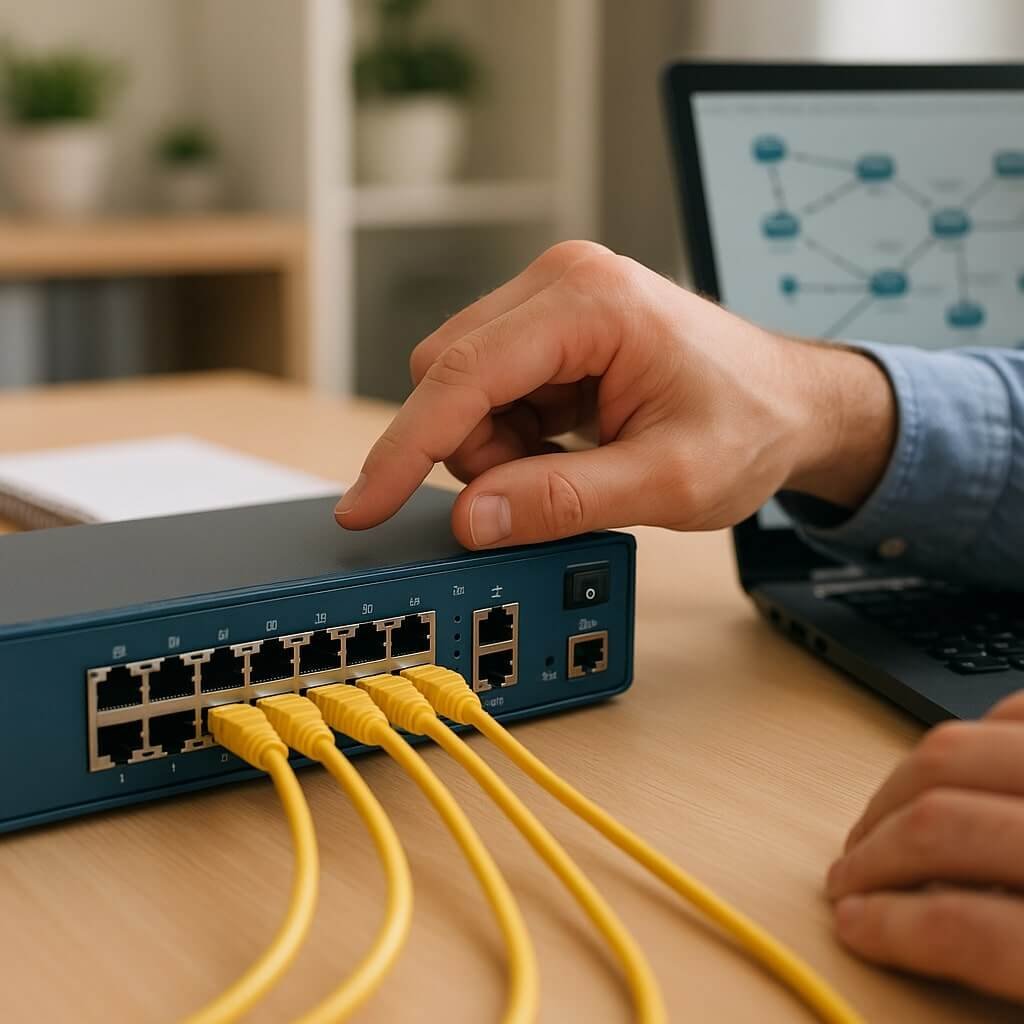Managed network security is vital for protecting your organization’s digital assets in today’s threat landscape. It involves constant monitoring, threat intelligence, and risk management to identify vulnerabilities and safeguard sensitive information. With cyber threats evolving rapidly, understanding the components of managed network security and the role of Managed Security Service Providers (MSSPs) becomes essential. As you consider your options, think about how effectively you’re mitigating risks and ensuring compliance. What strategies can enhance your security posture?
Key Takeaways
- Managed network security involves safeguarding digital infrastructure by identifying vulnerabilities and implementing protective measures against cyber threats.
- It provides continuous monitoring and analysis of network activity to enhance security and compliance.
- Access to specialized expertise through Managed Security Service Providers (MSSPs) helps organizations respond effectively to emerging threats.
- Proactive risk management strategies, including incident response plans, mitigate potential breaches before they escalate.
- Managed network security ensures scalability, allowing organizations to adapt their security measures as they grow while focusing on core business operations.
Understanding Managed Network Security
Managed network security encompasses a detailed approach to safeguarding your organization’s digital infrastructure. By understanding network security fundamentals, you can better identify vulnerabilities and implement appropriate measures.
Start with a threat landscape overview, which highlights the current and emerging cyber threats your organization may face. This knowledge allows you to prioritize risks and allocate resources effectively. You’ll need to take into account various factors, such as types of attacks, potential impact, and the likelihood of occurrence.
Additionally, staying informed about industry trends and threat intelligence is essential in adapting your strategies. By thoroughly grasping these concepts, you can enhance your network’s resilience, ensuring it remains secure against evolving threats while supporting your organization’s operational objectives.
Key Components of Managed Network Security
While steering through the complexities of network security, you must understand the key components that form the backbone of an effective managed network security strategy.
First, network segmentation is essential; it divides your network into smaller, manageable segments, reducing the attack surface and containing potential breaches. By isolating sensitive data, you enhance security and compliance.
Next, threat intelligence plays a significant role in proactively identifying and mitigating risks. Utilizing real-time data about emerging threats allows you to adapt your defenses and respond swiftly.
Additionally, continuous monitoring and analysis of your network activity guarantee you stay ahead of potential vulnerabilities.
Together, these components create a robust managed network security framework that protects your organization from evolving cyber threats.
The Role of a Managed Security Service Provider (MSSP)
When you partner with a Managed Security Service Provider (MSSP), you access specialized expertise in identifying and mitigating cybersecurity threats.
Their 24/7 monitoring and rapid response capabilities guarantee that your network remains secure around the clock.
Additionally, MSSPs offer cost-effective security solutions that can adapt to your organization’s specific needs.
Expertise in Cybersecurity Threats
Cybersecurity threats are evolving at an unprecedented rate, making it crucial for organizations to leverage specialized expertise.
As the cybersecurity landscape shifts, understanding the nuances of various threats becomes paramount. This is where a Managed Security Service Provider (MSSP) plays a critical role.
They possess in-depth knowledge of threat intelligence, enabling them to analyze emerging vulnerabilities and attack vectors effectively. By employing advanced tools and methodologies, MSSPs can offer insights that help you stay ahead of potential breaches.
Your internal team may lack the resources to monitor and evaluate the constantly changing threat environment. Therefore, partnering with an MSSP guarantees you have access to the latest knowledge and strategies, enhancing your organization’s resilience against cyber threats.
24/7 Monitoring and Response
As organizations grapple with the complexities of modern threats, having a Managed Security Service Provider (MSSP) for monitoring and response becomes essential.
An MSSP continuously analyzes network traffic and system logs, utilizing advanced threat intelligence to identify suspicious activities promptly. This proactive monitoring enables rapid incident response, ensuring your organization can mitigate potential breaches before they escalate.
With real-time alerts and forensic analysis, an MSSP equips you to respond effectively to incidents, minimizing downtime and data loss.
Cost-Effective Security Solutions
While many organizations struggle to balance security needs with budget constraints, partnering with a Managed Security Service Provider (MSSP) can transform your approach to cost-effective security solutions.
MSSPs offer affordable solutions by leveraging their expertise and economies of scale, allowing you to access advanced security technologies without the hefty price tag. They optimize your budget by focusing on risk management and prioritizing vulnerabilities tailored to your specific environment.
Additionally, MSSPs provide 24/7 monitoring and incident response, reducing the likelihood of costly breaches. With their proactive strategies, you can enhance your security posture while effectively managing expenses.
Ultimately, collaborating with an MSSP guarantees that your organization can maintain robust security without compromising financial health.
Benefits of Outsourcing Network Security
Outsourcing network security can considerably enhance your organization’s overall defense strategy, especially when you consider the complexities of today’s threat landscape.
One of the primary outsourcing advantages is access to specialized expertise. By partnering with professionals, you leverage their knowledge of emerging threats and best practices, ensuring your defenses are always up to date.
In addition, outsourcing provides scalability; as your organization grows, so can your security measures without the need for extensive internal resources.
A benefits overview also includes improved response times and 24/7 monitoring, which are critical for mitigating risks.
Moreover, outsourcing allows your team to focus on core business operations, enhancing productivity while maintaining robust security protocols.
Common Threats Addressed by Managed Network Security
In today’s digital landscape, you’re continually exposed to various network threats that can compromise your organization’s integrity.
Managed network security effectively mitigates risks associated with malware and ransomware attacks, phishing schemes, and insider breaches.
Understanding these common threats is essential for implementing robust security measures that protect your sensitive data and maintain operational continuity.
Malware and Ransomware Attacks
As cyber threats evolve, malware and ransomware attacks have become increasingly sophisticated, targeting organizations of all sizes.
You need to understand the various malware types—like viruses, worms, and Trojans—that can infiltrate your network. Ransomware can encrypt your data, demanding payment for its release, which can cripple business operations.
Effective ransomware prevention is essential to safeguarding your assets. Managed network security services implement robust defenses to counter these threats.
- Continuous monitoring for potential threats
- Regular updates to security protocols
- Employee training on malware awareness
- Data backups to mitigate ransomware impact
- Incident response plans for rapid recovery
Phishing and Social Engineering
While malware and ransomware attacks pose significant risks to organizations, phishing and social engineering tactics are equally insidious, often serving as the entry point for these threats.
You need to recognize that phishing tactics, such as deceptive emails or fake websites, exploit human psychology to trick users into revealing sensitive information.
Meanwhile, social engineering techniques manipulate trust, often leading individuals to bypass security protocols. By understanding these methods, you can better defend against them.
Managed network security solutions implement advanced filtering to detect and block phishing attempts, while employee training programs strengthen awareness of social engineering risks.
This proactive approach minimizes the chances of falling victim to these prevalent and damaging attacks, ultimately safeguarding your organization’s assets.
Insider Threats and Breaches
How can organizations effectively mitigate the risks posed by insider threats and breaches?
To safeguard sensitive information, it’s essential to adopt a proactive security posture. Insider threats can stem from both malicious intent and unintentional actions, leading to significant data breaches.
Implementing managed network security helps in monitoring and controlling access while enhancing your overall security framework.
Consider these key strategies:
- User Behavior Analytics: Identify anomalies in employee behavior.
- Access Controls: Limit data access based on roles.
- Regular Audits: Conduct frequent security assessments.
- Security Training: Educate employees on data protection.
- Incident Response Plans: Prepare for swift action during a breach.
The Importance of Compliance and Risk Management
Compliance and risk management are critical components of a robust managed network security strategy, guaranteeing that organizations not only meet regulatory requirements but also safeguard sensitive data against emerging threats.
By adhering to established compliance frameworks, you can avoid costly penalties and reputational damage. Implementing a thorough risk assessment allows you to identify vulnerabilities and understand potential impacts on your organization.
This proactive approach enables you to prioritize resources effectively, mitigating risks before they escalate into incidents. Regular audits and updates to your security measures further guarantee ongoing compliance and adaptability to new regulations.
Ultimately, integrating compliance and risk management into your security strategy not only protects your assets but also builds trust with clients and stakeholders.
How to Choose the Right Managed Network Security Provider
What should you consider when choosing a managed network security provider? Selecting the right provider is critical for safeguarding your network.
Start by evaluating the provider’s reputation—check reviews, certifications, and case studies. Service flexibility is also essential; make sure they can adapt to your specific needs and scale as your business grows.
Evaluating a provider’s reputation through reviews and certifications is crucial for ensuring they meet your unique needs.
Consider these factors:
- Experience in your industry
- Range of security services offered
- Response time and support availability
- Compliance with industry standards
- Cost-effectiveness of their solutions
Future Trends in Managed Network Security
As cyber threats continue to evolve, staying ahead of potential vulnerabilities in your network becomes increasingly critical.
Future trends in managed network security will heavily rely on emerging technologies like AI advancements and machine learning. These tools enhance threat intelligence, enabling quicker identification and response to security incidents.
Security automation will also play a pivotal role, streamlining operations and reducing the burden on your IT staff. By automating routine security tasks, you can focus on strategic initiatives.
In addition, the integration of advanced analytics will provide deeper insights into network behavior, allowing for proactive defenses.
As you navigate these trends, adopting a forward-thinking approach will be essential to fortifying your network against increasingly sophisticated threats.
Conclusion
In summary, managed network security is essential for safeguarding your organization against a dynamic threat landscape. By partnering with a Managed Security Service Provider (MSSP), you gain access to specialized expertise, advanced threat intelligence, and proactive risk management. This not only strengthens your security posture but also guarantees compliance with industry regulations. As cyber threats continue to evolve, embracing a thorough managed security strategy will empower you to focus on your core operations while effectively mitigating risks.






